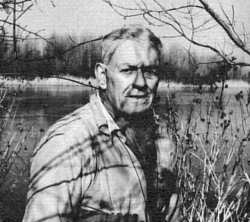Collecting Delaware Books
Dudley Cammett Lunt 1896-1981

Dudley Cammett Lunt was born in Maine and educated at Phillips Andover Academy and at Yale. Lunt trained at law and was a member of the bar in both Maine and Delaware. He practiced law in Delaware starting in 1924. In 1932 he went to London as the representative of the state to gather evidence in Delaware's boundary dispute with New Jersey. He wrote a regular column for the Wilmington Morning News which expressed his interest in the outdoors. Lunt lived for many years in the home known as the "Gardeners Cottage" on the estate which is now Rockwood Museum. This cottage was once occupied John P. Marquand.
Tales of the Delaware Bench and Bar
Lunt's Tales of the Delaware Bench and Bar is most often purchased as a gift for a lawyer. Published in 1963 by the University of Delaware Press, the 260-page book was born of a dinner table conversation amongst lawyers who bemoaned the fact that all the old stories might be lost. Lunt, an established author, historian, naturalist, and lawyer, was commissioned by the Delaware State Bar Association to write a book.
Despite the title, Tales of the Delaware Bench and Bar is more history than tales. It traces the development of law in Delaware from the Swedes and Dutch and the Duke of York to the present. A brief account of the 1669 jury trial of the Long Finne for rebellion shows both the harshness and compassion of the early judiciary.
Lunt gives considerable attention to William Penn, whose reforms were regularly vetoed by the king. Voluntary arbitration of civil suits was one of Penn's ideas that was ahead of its time.
Much of the book deals with the Delaware legal system from the Revolution to the present. Some of this is only of interest to lawyers, but the attempts to require popular election of judges, finally defeated in the 1897 state constitution, will be of interest to all. In 1726, lawyers were required to be "learned in the law." The same requirement was not placed on judges until 1897.
The historical narrative is brightened by anecdotes about George Read, the Ridgelys of Dover, John M. Clayton, John Biggs, Sr., and others. Stories of 20th century figures are rare, however.
Some of the stories bring early times to life. Alexander B. Cooper, Esq., wrote extensively of legal life in Sussex County. While he was a Deputy Attorney General in the 1880s, he and Attorney General George Gray would stay at the Brick Hotel opposite the courthouse in Georgetown. Daily life was recorded by Cooper. The meals were memorable. "In season we had roast pig, young tender, and rich, turnip greens, and cabbage sprouts, nicely boiled fish, chickens, ducks, turkeys, fresh eggs, and vegetables … . It was all placed on the table at once and we could eat when and what we pleased."
One interesting inclusion in the appendix is the rules of the 1826 New Castle County Bar Association, including a schedule of minimum allowable fees. Some of Lunt's contemporaries complained that fees had not gone up all that much in the intervening century. The book includes an extensive annotated bibliography.
Other Books
Lunt's other writings are also of interest. His The Bounds of Delaware is an essential book in any Delaware collection. It became important again in 2005 when New Jersey attempted to authorize a terminal for liquified natural gas tankers on a portion of the Delaware River claimed by Delaware. His books, dealing in history, the law, and the outdoors, are listed below.
- The Road to the Law. New York, Whittlesey House, McGraw-Hill, 1932. xiv, 281 p., 8 leaves of plates.
- Calendar of Papers Procured in England in re New Jersey vs. Delaware (Boundary Suit). Wilmington, 1935.
- The Bounds of Delaware. Wilmington [1947]. 69 p.
- The Howard Pyle School of Art. Historical Society of Delaware 1953. (Offprint from Delaware History, March 1953. [115]-177, [2] p. of plates.)
- The Wilmington Club, 1855-1955. Wilmington, 1955. 106 p. illus. (Anonymous)
- The Farmers Bank. [Philadelphia: Beck Engraving Co. 1957]. 308 p. illus. 26 cm.
- Thousand Acre Marsh. New York, Macmillan, 1959. 174 p., illus. by Mel Hunter.
- Tales of the Delaware Bench and Bar. University of Delaware Press, 1963. x, 260 p. illus.
- The Woods and the Sea (re: Maine). New York, Knopf, 1965. ix, 304 p. illus. by Henry Bugbee Kane.
- Taylors Gut in the Delaware State. Alfred A. Knopf, New York, 1968. ix, 303 p., illus. by Anthony John Florio.
- Lunt arranged and wrote notes for Henry David Thoreau: The Concord and the Merrimack. Boston. Little, Brown [1954]. xix, 268 p., illus.
- He also edited The River Selections from the Journals of Henry David Thoreau. New York, Twain Publishers [1963]. 244 p., illus.